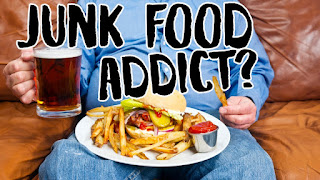“I consider junk food to be anything that doesn’t have any nutritional value,” says Shayna Komar, a licensed and registered dietitian at Thomas F. Chapman Family Cancer Wellness Center. “Processed foods are mainly salt, sugar, fat and preservatives — all of which create a combination of different sensations in your mouth. Your brain is involved as well. Foods that rapidly vanish or ‘melt in your mouth’ signal to your brain that you’re not eating as much as you actually are. In other words, these foods literally tell your brain that you’re not full and you need more of the food. It sounds good, but actually, you are not fueling your body, but burdening it to work very hard to metabolize junk food.”
Most fast food items are heavily flavored using synthetic ingredients that are scientifically designed to get you "hooked". In his disturbing book, The Hacking of the American Mind, Dr. Robert Lustig explains how the design of fast foods intentionally stimulate the same regions of the brain as alcohol or cocaine by acting on the neurotransmitter dopamine. Fast food is a factor in more annual deaths in the United States than smoking.
Junk food addiction is a comprehensive term and pretty much encompasses anything which adds calories, fat, and sugar with few nutrients to back it up. Soda, salty snacks, many traditionally prepared baked goods, fast food, packaged food the list goes on and on. Fast food outlets typically offer little else. Even if you head for the salad bar you will find plenty of unhealthy choices, high calorie dressings and pastas.
Though the term “addiction” is often thrown around lightly, having a true addiction is a serious problem. The symptoms and thought processes related to food addiction are similar to those of drug abuse. It’s just a different substance and the social consequences may be less severe. Food addiction causes physical harm and leads to serious diseases like obesity and type-2 diabetes. It may negatively impact your self-esteem and self-image, making you unhappy with your body. Food addiction may also take an emotional toll and increase your risk of premature death.
What to do? The best, smartest choice would be to never set foot in a fast food restaurant again - at least not until they get the message, which will be a very long time.
But junk foods are everywhere and a major part of modern culture. They are cheap, convenient, fast and deviously satisfying. Avoiding them is not easy but does become easier with time. The less junk food you eat, the less you will crave. and your cravings may disappear entirely in time, often is a little as 6 months. So take heart.
As with other addictive substances, you can break free of your cravings. Follow these tips from experts at the University of California to break your junk food habit:
1. Plan your meals: If you already have a healthy meal prepared, that will help you avoid unhealthy choices. “Not all foods are created equally,” said Ashley Gearhardt, assistant professor of clinical psychology at the University of Michigan, who co-developed the Yale Food Addiction Scale to help identify people at high risk for food addiction. “You don’t see people binging on apples.”
2. Learn your "triggers". Awareness is an important first step. Pay attention to those moments
when your cravings start so you can figure out what unleashes them. Stay away from situations and places that usually end up with a trip to the Coronary Burger Barn.
3. Replace addictive foods with foods you like but don’t struggle with: “We need food to survive,” Gearhardt said. “You should enjoy eating. You’re not going to stick to a diet of gruel and broccoli.” Remember it need not be all or nothing. Even cutting back will make a difference and make further progress easier.
4. Remember that nobody is perfect. Don’t judge yourself too harshly for occasional junk food lapses. If you take an all-or-nothing approach, you can feel even more hopeless after giving in to your cravings. Food cues are strong and can be difficult to avoid, and it takes time to learn your triggers and get better at making healthy choices.
Or, just ignore it all and enjoy your diabetic heart attack. After all, what's good for Fast Food is good for America!




No comments:
Post a Comment